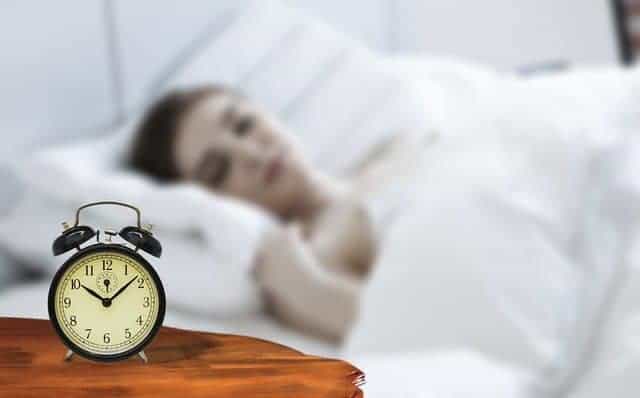It is indisputable that a good night’s sleep is crucial for our health, and if we suffer from insomnia or do not get enough sleep, the consequences can be disastrous. Insufficient amount of sleep causes a number of disorders of neurological nature, and in the long run may also lead to many other health consequences. Therefore it is worth getting to know the basic principles of sleep hygiene, which will enable us a proper night’s rest and as a result proper functioning of the whole organism.
Table of contents
Sleep and wakefulness
The human organism, similarly to animal organisms, is equipped with a kind of an individual biological clock, which determines the rhythm of sleep and wakefulness. A huge role in this process plays melatonin, sleep hormone produced by the pineal gland, thanks to which we enter the most valuable phase of deep sleep. It is during this phase that the body rests and undergoes full regeneration.
Melatonin regulates not only the rhythm of sleep and wakefulness, but also temperature, fat metabolism, sexual activity. Moreover, it helps eliminate cancer cells and minimizes the risk of depression.
It has been proved beyond any doubt that melatonin not only facilitates falling asleep, but also improves the quality of sleep and reduces the number of awakenings during the night. Unfortunately, more and more often we experience deficiencies of this hormone, as a result of which sleep problems appear in the form of difficulty falling asleep, lack of sleep at all or so called shallow sleep not giving rest, waking up during the night or waking up too early.
All this results in bad mood, deterioration of mental functions, fatigue, greater susceptibility to stress, deterioration of physical health.
Phases of sleep

There are two basic phases of sleep, referred to by the abbreviations NREM and REM.
NREM phase, or slow-wave sleep, occurring first, is characterized by slow eye movements, more regular and deeper breathing, a decrease in blood pressure and muscle tone, and a slight decrease in body temperature. In this phase, the brain clearly decreases activity preparing the body for the next stage – the REM phase.
In the REM phase, dreams appear, and the brain receives almost exclusively internal sensations. This stage of sleep allows for full regeneration of the body, and in the opinion of many scientists, allows you to remember the information acquired during the day. Both phases occur alternately, creating 4-5 cycles during the night.
Only night rest guarantees healthy sleep, because this is how our biological clock works. In the evening, the process of melatonin secretion, the sleep hormone, begins and lasts all night. Then the body undergoes the most effective regeneration, so in the morning we feel rested and full of mental strength.
In fact, each of us knows very well that it is in the morning and before noon that our intellectual performance is the highest, and it gradually deteriorates as the day goes by. In this daily renewal process, proper sleep hygiene is very important.
Insomnia and its consequences
In the past, insomnia, expertly referred to as insomnia, was mainly attributed to the elderly. However nowadays various types of disorders of night rest are common also among young people. Unfortunately, it is mainly the result of our modern lifestyle, full of tension, stress and hurry.
It is difficult to fall asleep, and then to sleep peacefully, when you are overworked, nervous, worried, and your head is full of unpleasant thoughts. What’s worse, neither an evening spent in front of a computer or TV screen nor alcohol not only helps, but actually makes it harder to fall asleep or sleep soundly.
While a temporary lack of sleep is not a worrying phenomenon, because subsequent well slept nights restore full strength and eliminate the effects of sleeplessness, prolonged problems of this nature significantly affect the condition of the body as a whole, especially the nervous system and mental functions.
An insufficiently rested and regenerated organism remains in a state of constant agitation. Our mood deteriorates, we feel permanently tired, our susceptibility to stress increases, our ability to concentrate, memorise and think logically decreases. This is accompanied by a decrease in mood, irritation, which again, in the following evening, does not allow us to fall asleep. In this way, a vicious circle is created.
Insomnia or a worse quality of sleep has also a concrete influence on our physical health. Apart from neurological and psychological disorders, there are headaches, reduced physical fitness, hypersensitivity to light and sound, increased risk of heart disease, diabetes, hypertension, sexual dysfunction and other problems, not to mention the disastrous appearance of permanently sleep-deprived people.
Doctors also stress the extreme importance of good sleep for our immune system.
New phenomenon – making up for lost free time at the expense of the night

Recently, we’ve seen yet another factor significantly impacting sleep disorders. Many people, extremely busy during the day, finally find some time for themselves only in the late evening or at night. Unfortunately, we spend this free time in the company of digital devices in the mistaken belief that this is how we relax. Meanwhile, the screen of a smartphone, tablet or laptop, emitting strong artificial light, is a signal to our brain that it still needs to be active, contrary to the biological clock.
Studies have shown that the more time we spend in front of a screen of some kind, the worse we fall asleep, and as the pandemic has multiplied this time and further blurred the boundaries between work and rest, sleep problems have become much worse.
About 40% of adults now suffer from sleep deprivation, in large part as a result of exposure to electronic devices. Young people are likely to be affected to an even greater extent. Meanwhile, it is extremely important for health and well-being to be able to distinguish between work and rest, wakefulness and sleep. This is achieved, among others, by observing the principles of sleep hygiene.
Sleep hygiene principles, or how to prevent insomnia and sleeping problems
Healthy lifestyle
Despite appearances, proper diet also has an impact on the quantity and quality of sleep. Late eating of suppers, especially heavy ones, directly translates into impaired night rest and, as has been known for a long time, nightmares. It is also important to remember that problems with falling asleep and the quality of nightly rest can be a result of stimulants.
And so, for example, alcohol, although it makes falling asleep easier, it causes us to wake up more often during the night and we sleep shallowly and superficially. So eat a light dinner no later than 2-3 hours before going to bed, give up evening coffee, strong tea, cigarettes and drinks.
Physical activity
It seems to be a truism that movement is health, but still many of us underestimate the importance of physical activity for health in general and for good sleep. Meanwhile, for example, a daily evening walk can do a lot of good – find out for yourself!
Regular sleep-wake rhythm
It is extremely important to observe regular hours of rest at night, because then the body gets used to a certain rhythm, sleep comes easier, is calmer and deeper. So go to bed at the same time, avoid naps during the day, sleep regularly 7-8 hours a night.
The role of light
Light is a strong stimulator of the body’s activity in the diurnal cycle. If late in the evening we subject our body to long exposure to artificial light, we disturb the functioning of our biological clock. Exceptionally bad for the quality of sleep affects blue light emitted by screens of electronic devices. It significantly reduces the secretion of melatonin, and thus the process of falling asleep is disrupted. It is therefore best to avoid contact with a laptop, smartphone or TV for at least an hour before going to bed.
Optimum temperature
It is much better to sleep in a cool room and, what’s more, well ventilated if, due to the season, you cannot sleep with the window open. According to specialists, the optimum temperature in the room in which we sleep should not exceed 18-20 degrees. Since at night our body temperature is slightly lowered, it is also a good idea not to take hot baths immediately before going to bed.
Relaxation before going to bed
An unquestionable way to get a good night’s sleep is to calm down and relax. This is sometimes difficult to achieve, but necessary. It is impossible to fall asleep and sleep well when we are nervous, tense, stressed or worried. So avoid strong emotional stimuli, for example in the form of a thriller, and in order to relax, reach for a nice book, calm, relaxing music or sounds of nature, do some breathing exercises, drink chamomile infusion.
Comfort in the bedroom
Apart from fresh air and proper temperature, what is important in a bedroom is also the equipment of a bed, mattress and bedclothes, adjusted to our body and season, as well as the environment. The room you sleep in should be insulated from external factors such as street lights or noise. If you have trouble falling asleep, take your watch out of sight. Nervously checking the passing hours is certainly not helpful in falling asleep.
Natural supplements supporting fight against insomnia
Since melatonin plays a key role in this issue, with deficiencies becoming an increasingly common source of problems, if you are struggling with insomnia, you can take advantage of supplements available on the market that have this substance in their composition. One of them is sleeping pills without a prescription Melatolin Plus. This high quality product contains natural and safe ingredients, namely, in addition to melatonin, extracts from lemon balm, ashwagandha root, hops cones, saffron flower, among others.
Melatolin Plus has a relaxing and calming effect, makes it easier to fall asleep, supports deep sleep and full body regeneration.

Sources:

